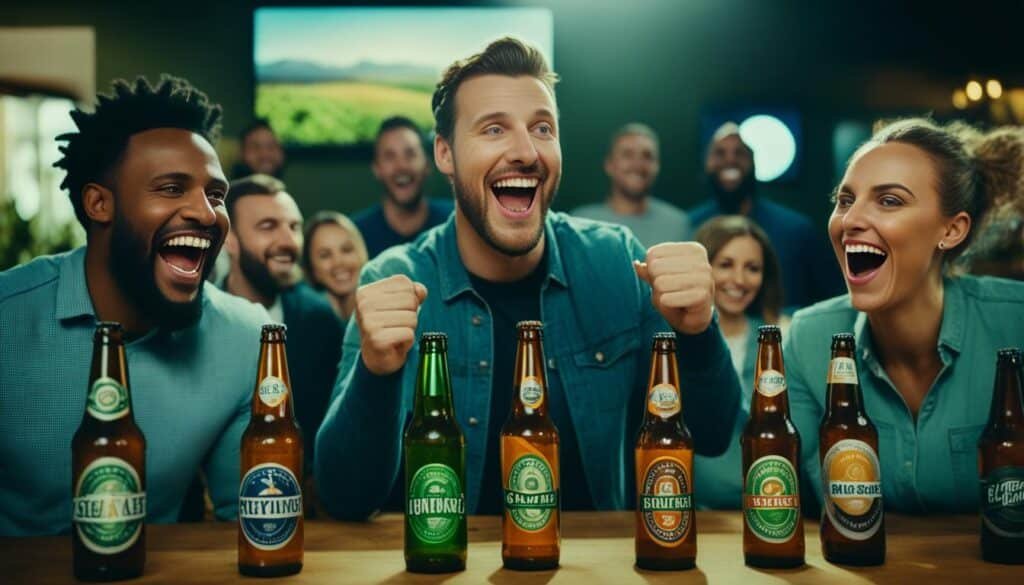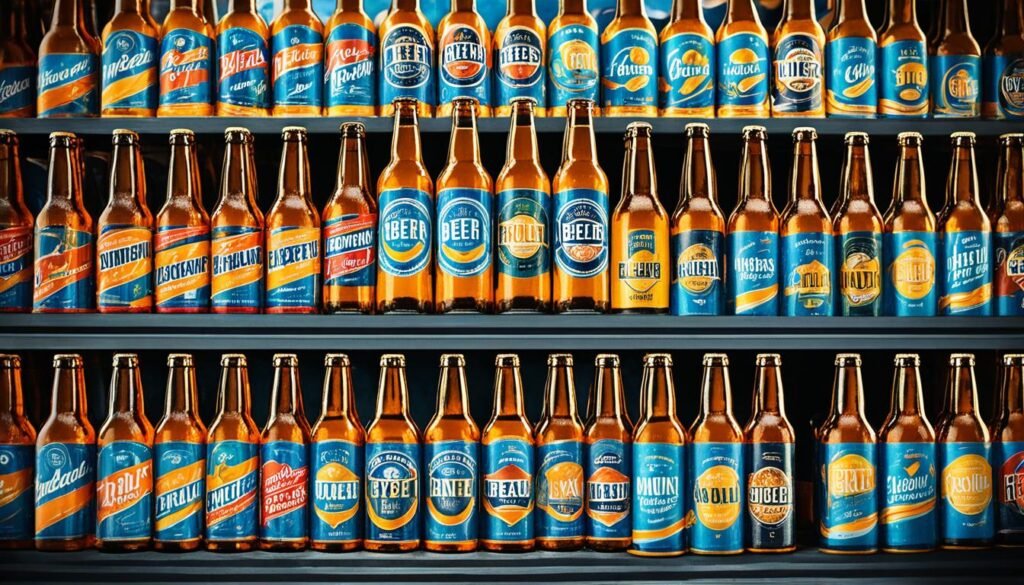The landscape of the South Africa beer market has shown substantial growth, demonstrating resilience and adaptability as it reached an impressive market size of LCU120.47 billion in 2022. With the promise of a robust Compound Annual Growth Rate (CAGR) of over 4% from 2023 to 2028, the focus on traditional brewing techniques and quality ingredients seems to be paying dividends. This vibrant market, featuring prominent brands such as Carling Black Label and Castle, continues to evolve, driven by stalwarts like SAB and Heineken South Africa. The nuanced strategies of these companies address both on-premise and off-premise distribution channels, successfully navigating a market that is increasingly tilting towards premiumization.
Identifying the Most popular beer in South Africa is not just about looking at sales figures, but also understanding the consumer psyche and market trends that favor brands showcasing heritage and quality. The economic upswing has not only increased consumer spending but has also triggered an elevated interest within the premium segment of beers. As a result, the Best-selling beer in South Africa has to resonate with the purchasing power and the discerning taste of its consumers, making the competition in this space as intriguing as it is fierce.
Key Takeaways
- South Africa’s beer market reached a significant size of LCU120.47 billion in 2022.
- Consumer inclination towards premium beer options is driving market trends.
- Economic growth has enhanced consumer spending in the beer sector.
- Brands like Carling Black Label and Castle lead in terms of cultural resonance and market share.
- Strategic market positioning by top companies is pivotal in addressing the competitive landscape.
- The industry is projected to continue its growth momentum over the next five years.
- The premium segment’s growth is indicative of changing consumer preferences towards quality and tradition.
An Overview of South Africa’s Thriving Beer Market
As 2022 unfolded, the South African beer industry experienced a remarkable surge driven by heightened economic activity, which particularly benefitted the tourism and hospitality sectors. This positive trend has been a boon to South African beer sales, manifesting in an enthusiastic market reception of premium beer variants.
In tandem with the economy’s upswing, consumer inclinations trended towards upscale, better-quality beers, underscoring a sector-wide shift towards premium products. Renowned brands within this domain successfully fostered a deeper relationship with their customers, driving brand loyalty through a mix of tradition and quality.
Key to the prosperity of the South African beer industry has been the predominant role of the on-premise sector. Bars and restaurants, in particular, witnessed a substantial upturn in beer consumption, underscoring the sector’s robustness and vitality.
Despite the evident inclination towards innovation and premiumization, South African consumers have continued to exhibit a preference for the classic glass bottle packaging, revealing an adherence to tradition within the beer market. This choice not only speaks to consumer behavior but also suggests that the familiarity and trust in tried-and-true packaging continue to influence purchasing decisions.
The narrative of the South African beer industry in the previous year is indeed one of prosperity and momentum, a testament to the sector’s resilience and adaptability in the face of evolving consumer preferences and economic landscapes.
What Drives the Popularity of the Top Beer Brands in South Africa?

Rooted in the vibrant culture of South Africa, beer enjoys a special place in the social fabric of the nation. A confluence of consumer trends and a flourishing economy has crafted a narrative of growth for the leading beer brand in South Africa. Within this tale, one finds the threads of premiumization and economic forces blending to propel popular beer brands to the forefront of the market.
Trends in Consumer Preferences and Premiumization
The notion of premium beer options is not stagnant; it evolves with the palates and aspirations of consumers. South Africans have shown a growing affinity for premium beer options, with discerning drinkers leaning towards tastes that promise complexity and quality. This shift is not merely about flavor but also reflects status, lifestyle choices, and a sense of belonging to a more global beer aesthetic.
Impact of Economic Growth and On-Premise Consumption
As pockets deepen and confidence rises, so does the propensity to experience beer within the on-premise context—bars, restaurants, and social venues. The economic impact on beer sales is evidenced in the swelling tides of on-premise consumption, where momentary transactions blossom into lasting brand loyalties. This phenomenon elevates the social visibility of popular beer in South Africa, intertwining with the narrative of economic resilience and consumer indulgence.
| Year | Economic Growth Rate | Premium Beer Sales Increase | On-Premise Consumption Growth |
|---|---|---|---|
| 2020 | Low | Stable | Decline due to restrictions |
| 2021 | Moderate | Significant Rise | Moderate Recovery |
| 2022 | High | Marked Increase | Substantial Growth |
In the contest for market dominance, global giants like AB InBev and Heineken are not just competitors; they are architects of the changing beer landscape. Their strategies, crafted for allure and engagement, have in many ways become the measure of success for what defines a leading beer brand in South Africa. Through aggressive marketing and a keen awareness of local preferences, these brands continue to shape the drinking culture and dialogues around it.
Understanding South Africa’s Beer Sales and Market Expansion

The resilience and growth of the South Africa beer market are unmistakable, driven by targeted market expansion strategies by influential brands such as Heineken. These strategies aim not only to increase South African beer sales but also to secure consumer loyalty and open new demographic segments. Given the widespread preference for larger bottle sizes, promotions of these products have led to a surge in sales, underscoring the effectiveness of these expansion strategies.
Market expansion strategies revolve around adapting to consumer preferences and innovating the product portfolio. Heineken has leveraged its extensive array of products to capture a broader customer base, placing more significant emphasis on mainstream beer sectors. Here’s a look at how Heineken and other giants are crafting their approach:
- Focus on scalable and adaptable promotional tactics for mainstream beer offerings.
- Introduction of varied bottle sizes to appeal to a wider audience spectrum.
- Amplify market coverage through both urban and rural sales drives.
While Heineken’s tactics illuminates part of the market expansion blueprint, other brands in the South Africa beer market are not far behind. The consistent rise in South African beer sales can be credited to these efforts that not only seek short-term sales boosts but also aim for long-term market consolidation and growth.
Understanding the consumer drive towards personal consumption experiences, the beer industry in South Africa tailors its marketing strategies to resonate with local tastes and social moods.
Long-term growth in the beer market hinges on the understanding of social and health challenges related to alcohol consumption. This understanding influences and integrates with market strategies, aligning with consumer advocacy and responsible drinking initiatives. Thus, the expansion of the South Africa beer market extends beyond sales and profit, acknowledging a role in the broader societal context.
What is the Biggest Selling Beer in South Africa?
In a market that has seen a robust competition among an array of brands, one name stands out for its consistent appeal and superior sales metrics. Amidst a growing industry, the flagship of beer performance in South Africa has been anchored by none other than Carling Black Label. This brand has not only captured the hearts of local consumers but has also clinched the title of the top beer brand in South Africa when considering both sales volume and market influence. As 2022’s figures demonstrate, this veritable brew has outperformed its nearest competitors to remain at the summit of the beer market.
Leading Brands by Sales Volume and Value
The accolade of South Africa’s best-selling beer is not bestowed lightly, with fierce competition in both local and international players vying for market dominance. Yet, amidst this landscape of perpetual striving for excellence, Carling Black Label emerged as the leader, testament to the brand’s quality and the successful resonance of its marketing strategies. A blend of historical legacy and modern appeal has been a crucial factor in securing consumer loyalty, driving impressive sales volume and creating significant market influence for Carling Black Label.
Carling Black Label: A Case Study of Market Dominance
Carling Black Label’s market dominance is not just about selling the most beer; it’s about creating a brand that consumers trust and prefer. Their journey encapsulates essential marketing lessons, from the importance of brand image to the strategic value of tapping into consumers’ evolving preferences. South Africa’s beer landscape is shaped profoundly by Carling Black Label, as the brand continues to leverage its status to set trends and influence the broader beer sales trajectory. As it stands, Carling Black Label represents something more than a beverage; it’s a symbol of quality and a benchmark for the entire South African beer industry.
